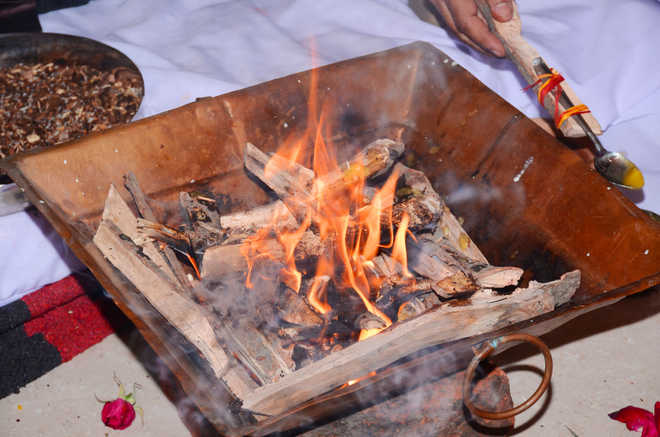Agnihotra Vedic way of purifying the atmosphere
Agnihotra, also called daiva yajna, havana or homa, is the Vedic way of purifying the atmosphere by fumigating clarified butter, grains, odoriferous substances, dried cow-dung cakes, herbal powder and sticks of specified trees, along with the chanting of mantras. Based on the biorhythms of nature, ‘it activates the subtle interplay of energy currents in the biosphere’ and has a beneficial effect on the body and the mind. Regular and methodical practice of Agnihotra is said to bestow material welfare (abhyudaya) and spiritual perfection (nihshreyasa).
Agnihotra is performed twice a day when day and night meet in consonance with the circadian biological cycles recurring at approximately twenty-four-hour intervals, which bring about a magnetic change in the human body. The fact that Agnihotra removes pollution is being increasingly recognised by scientists. ‘An odoriferous substance put into the fire is not destroyed, but, on the other hand, being rarefied, fills the room, and is carried by the air to distant places where it rids it of its foulness’, wrote Maharishi Dayananda (1824-1883). ‘Sacrificial fire breaks up the impurities of the air, and reduces them to their component parts, which, getting lighter, are expelled from the house and replaced by fresh air from outside.’
Scientific researches
Scientific researches undertaken in India and the West reveal that Agnihotra-fumes caused by cow-dung cakes, twigs of sacred trees, camphor, dry guggula (a resin), unbroken rice and cow’s ghee, reduce the microbial count by over 90 per cent where the sacrificial fire is lit, increase positive energy in the atmosphere, ‘make an impact on clouds or rain water in removing the acid base’, and act as a catalyst on plant metabolism.
Sprinkling of Agnihotra-ash (vibhuti) is of great help in protecting plants and trees from insects and pests, as proved by biochemical studies undertaken by the University of Pune at the behest of Institute for Studies in Vedic Sciences, Shivpuri (Akkalkot, district Solapur, Maharashtra). Agnihotra-ash has been found to be useful in the treatment and preservation of food grains and seeds.
Agnihotra is a panacea for many human ailments - its application or oral use can cure depression, migraine, addiction to alcohol and drugs, skin-fungus, non-healing wounds, kidney-pain, gastritis, tonsillitis etc. Scientific findings echo and reconfirm the wisdom of Indian sages who turned Agnihotra into a sacred ritual by making it a part of the pancha-mahayajna, ‘five great sacrifices’ to be performed daily by a householder.
The tradition of giving Agnihotra-ash as prasada, sanctified food, to the devout continues to this day. The best kind of it is known as satta svaha or a mixture of seven ashes, generally made up of wood or twigs of tulasi, pipal, neem, vata, shishma, apamarga and akka .
Agnihotra, which the ignorant describe as ‘the most wasteful burning of endless quantities of clarified butter and wood’ may greatly help in solving world’s food problem. Manu Smriti (III.75) says in this context: ‘Oblations properly poured into fire reach the sun, sun causes rains and food grains come there from; the living beings are born of grains.’
Scientists who conducted experiments on Agnihotra in a rural grapes’ farm in Maharashtra, discovered that ‘the seeds germinated in twenty-one days instead of the normal six months’ when exposed to ‘agnihotra — atmosphere’. Another study showed that the yield of agnihotra-ash-treated-seeds was higher by 30 per cent as compared to ordinary seeds.
Maharishi Dayananda who revived the Vedic fire-sacrifice observed: ‘In the golden days of India, saints and seers...kings and queens and common people used to spend a large amount of time and money in performing and helping others to perform homa; and so long as this system lasted, India was free from disease and its people were happy. It can become so again, if the same system were revised.’
Would we heed his advice?
(Dr Satish K Kapoor, former British Council Scholar and former Registrar, DAV University, is a noted author, educationist, historian and spiritualist based in Jalandhar city.)









